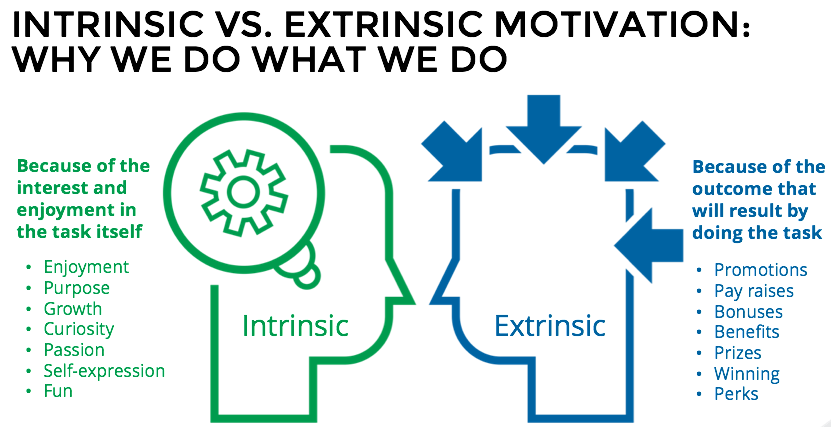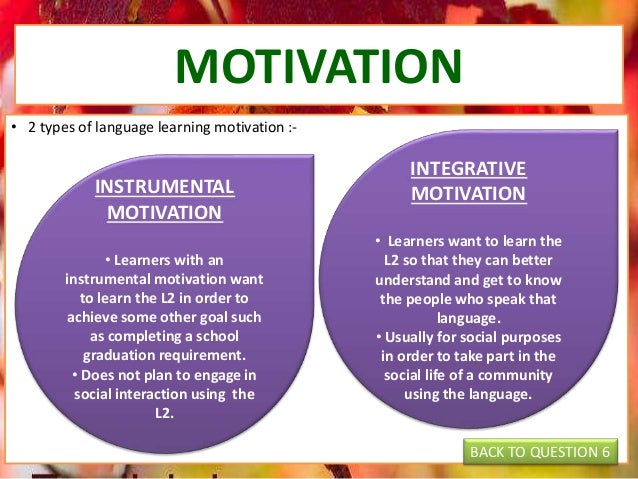Motivation in Second language Learning : Kinds and Factors
Dear Students
Greetings!!
Read the following before you attend the class today;
Motivation
in Language Learning: Kinds and Factors
Motivation is important for completing any
task. The success or failure of a task depends on motivational factors. Research shows that motivation plays a great
role in mastering a foreign language. Gardner says that the desire to learn a
language and the attitudes one has will help to develop a language.
Motivation is of four kinds.
Dornyei defines that motivation is of two kinds
– ‘intrinsic’ and ‘extrinsic’. Intrinsic motivation refers to the
enjoyable conditions in achieving an action. Extrinsic motivation refers to the
external conditions that help in achieving a target, i.e., offering a reward or
avoiding a punishment. These two are interdependent.
Brown and Gardner explained motivation as ‘instrumental’
and ‘integrative’ motivation. If we acquire a language to get a job or to
understand a brochure or a technical tool we use it as an instrument. It is called
instrumental motivation. This is short lived.
‘Integrative’ motivation helps the learner to
integrate himself with the culture of the second language group and become
involved in the social change. Integrative motivation helps for higher levels
of proficiency.
There are three factors that govern ‘motivation’.
1. Positive
attitude: The
learner should have an attitude towards the L2 community and that desire leads
him / her to become a member.
2. Enjoyment
of Learning: The joy of
learning internally motivates the learner to learn a new language quickly and easily.
Intrinsic motivation is stronger than extrinsic motivation.
3. External
Pressures: Certain external pressures like winning the appreciation of
teachers and parents, or examinations also help learners to acquire L2.
Learners'
motivation can go up and down depending on the context of language learning.
Motivation has a key role in the development of language skills. Teachers can
play a significant role in motivating learners to the learning of a
second/foreign language.
Answer the following questions:
1. What is 'motivation'?
2. How many kinds of 'motivation' are found?
3. Explain 'intrinsic' and 'extrinsic' motivation.
4. What is the difference between ' instrumental' and ' integrative' motivation?
5. Describe the three factors that govern motivation.
Additional Inputs:



Thanks and Best Wishes!
Dr.KVB

1.motivationn is completing any task. The success or failure of a task depeds on motivation factors. Motivation plays a great role in mastering a foreign language. Gardenr says that the desire to learn a language and the attitude one has will help to a language. Learners motivation can go up and down depending on the context of learning. Motivation has a key role in the development of language skills
ReplyDeleteMotivation is important for completing any task. The success or failure of a task depends on motivational factors.research shows that motivation plays a great role in mastering a foreign language.gardner says that the desire to learn a language NB and the attitudes one has will help to develop a language.learners motivation can go up and down depending on the context of language learning.motivation has a key role in the development of language skills.teachers cab play a significant role in motivating learnars to the learning of a
ReplyDeleteSecond/foreign language.
Motivation is of four kids. Intrinsic and extrinsic, instrumental and integrative 3.Intrinsic motivation refers to the external codtions an action. Extrinsic motivation refers to the external conditions that help in achieving a target, offering a reward or avoiding a punishment. These two are interdependent. 4.Instrumental mativation if we acquire a language to get a job or to understand a brochure or a technical tool we use it as instrument. It is called instrumental motivation. This is short lived. Integrative motivation help the learner to integrate himself with the culture of the second language group and become involved in the social change .Integrative motivation helps for higher level of proficiency. 4.There are three factors that govern motivation. 1.Postive attitude : The learner should have an attitude towards the l2 community and that desire leads him or her to become a member. 2.Enjoyment of learning :The joy of learning internal motivates the learner a new languages quickly and easily. Intrinsic motivation is stronger than extrinsic motivation. 3.External pressures :Certain external pressures like winning the appreciation of teachers and parents or examination also help learners to acquire l2.
ReplyDeleteUsha send the answer the above are mine answers
ReplyDeleteGive your name at the end plz
ReplyDelete